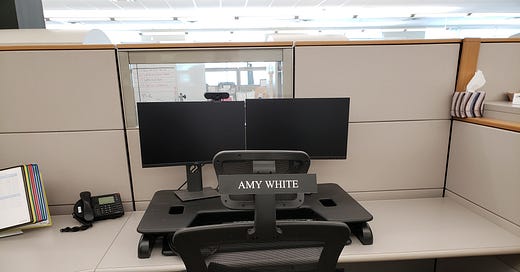Endings come and go, but closure is a luxury.
- Emily P. Freeman
Hello and welcome. In case we haven’t met in person, my name is Amy. For the past 3 years, I’ve been an Equity Specialist (teacher on special assignment) for a public school district. Three and a half months ago, I learned that funding for my position was cut due to a budget shortfall, and I’ll return to teaching in the classroom fall 2024.
The elimination of my position is a forced ending that has also been long and drawn out (knowing that your position is cut and still working in said position for 3.5 more months is an emotional roller coaster to say the least). There has been so much of the process that’s out of my control - from when and what was communicated to the timeline for knowing where I’ll be working next. There have been times that I’ve felt powerless in the situation and those feelings can easily lead to a sense of defeat.
As I’ve learned from Emily P. Freeman, endings are inevitable and a regular experience of life. Closure, however, is not the same as an ending. Sometimes we have to fight for closure. She writes, “How can you bring closure to an ending? Put a period on the experience by naming what you’re bringing with you and what you’ll leave behind.”1
Starting this series of essays is one of the ways that I’m seeking closure by sharing what I’ve learned that I’ll be bringing with me. I want to process through and unpack the lessons that have deeply shaped who I’ve become, and keeping it all in a private journal just didn’t feel right. I recognize the incongruence between welcoming you to something new that is simultaneously a way of seeking closure to an ending, but this is one of the ways I’m starting a new chapter.
Some of the things I’ve learned and will unpack in the coming weeks (and likely months) include:
The power of presence
Why starting with self-awareness is crucial
Favorite diverse fiction I’ve read in the last 3 years that’s broadened my perspective and deepened my empathy
How I self-reflect on levels of culture (and what “levels of culture” means)
And much more
Thanks for joining me.
What are some ways you seek closure in the midst of an ending, whether the ending is forced, expected, or chosen? How can you name what you’re bringing with you and what you’ll leave behind?
I’m excited for us to be able to learn from each other as I share what I’ve learned. It’s important that sharing and learning be welcoming and inclusive.
Expectations for comments:
Be curious
Be kind
Comments not aligning with these expectations will be deleted.
Freeman, E. P. (2024). Endings and Closure. How to Walk into a Room: The Art of Knowing When to Stay and When to Walk Away (pp. 150–152). HarperCollins Publishers.






Love this. Love you!